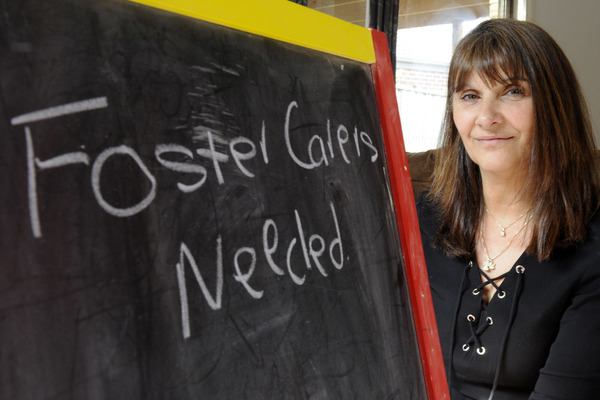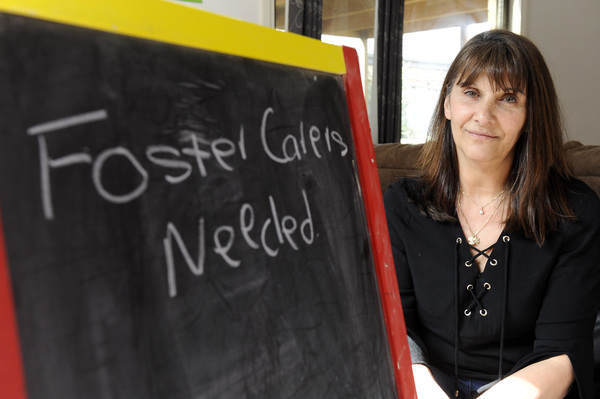By Brendan Rees
When Pakenham grandmother Pina Johnson decided to put her hand up to become a foster carer, she never knew how much it would change her life, but says it has “been the best thing I’ve ever done.”
Ms Johnson began fostering an 11-year-old boy last September and says the fulfilment of fostering has taught her more about herself and the world than she could have ever learnt on her own.
“It’s nothing like what I thought it would be. I was worried about challenging behaviours. I was worried about dealing with the whole foster care. There’s a big stigma about it all. I was just worried about what I would get into,” she says.
“I’ve had my own children and when I found myself single about 18 months ago and the kids were all off my hands, I decided to get into it and it’s been the best thing I’ve ever done.”
“As you get older you start to look for meaning in life and purpose instead of just existing I wanted to live.”
Three months later, after her first foster child, Ms Johnson called her agency, Key Assets requesting to have a couple of girls.
When she was told that they had found not only two female siblings aged four and six, whose names cannot be revealed, but also their three-year-old brother, Ms Johnson had no hesitation in welcoming them into her home.
“When they first came into my care, I’m like ‘All my god … four of them’ but they (agency) made sure they went to child care during the day to give me a break. They made sure I could slip into the role.”
Figures from Australian Institute of Family Studies show more than 14,000 children needed care last year with the number of people willing to become a foster carer at an all-time low.
Ms Johnson says fostering is highly rewarding and encourages everyone who is “in a good place” to be a carer. “It’s not like you take on children and you’re left to it. It’s nothing like that at all. It’s such a supportive journey. You’re not committed for any length of time,” she says.
She says the children are “so loving,” and have their own personality which she admits, she didn’t expect. “Considering what they’ve gone through they are all beautiful souls.”
Challenging behaviours were an initial shock, she says. “I had to learn. I didn’t realise how powerful love was. I didn’t realise hug and cuddles and being gentle and kind changed their worlds.”
She says if a child were to throw a tantrum, she doesn’t see a naughty child, instead a child that is hurt and can’t regulate their own behaviours.
“The child’s frightened and the child’s scared and they’ve never learnt to deal with their issues. The longer you stay in foster care, you become attuned with the children. You get to know the children and it’s like anyone else – you’re just pacifying someone that is hurt.”
Ms Johnson says the children even apologise for their outbursts, admitting love is a powerful thing. “When a child’s having a bit of a meltdown you give them a hug and you tell them they’re okay.”
“It’s a crazy house, but it’s a happy crazy house. Even when a child is having a melt-down, the other littlies come up and give that one a hug at the right time. They are so compassionate well before their years. These children are overcoming adversities.”
Asked if she had seen a change in the children’s development, she pauses, and says “All my god. When I first got the kids, especially the youngest two kids were completely full on, they weren’t talking properly. They seem to lack the stage of development I thought they would’ve been at for their ages. And they’ve been in my care for 10 months and I cannot believe the difference.”
A grandmother of two grandchildren, Ms Johnson says she doesn’t need a ‘thank you’ for fostering; instead watching the children grow in their personal development is all she could ask. “I see it in the way they interact. They’re just happy kids now. They certainly weren’t when they came. They were very disengaged and didn’t want to know me. They were frightened of me. And now they just love children.”
The youngest, she says, was dribbling at age two. “He no longer dribbles which seems like nothing but displays to me he’s come so far. He’s talking, he’s forming sentences. He’s not as far as we’d like him to be, but the changes are phenomenal.”
The four-year-old girl, she explains, was difficult at first and was “tossing” up whether she could keep her. “Over time, once we connected and I can’t believe how much of change there was. That child now and myself have a stronger bond then what I ever thought was going to be possible.”
For Ms Johnson, she says, after bringing up her own children, she feels much wiser. “There’s nothing more rewarding then taking them to school and watching them grow. You’re thoughts are different second time round.”
Despite the challenging behaviours, she says the support of the Department of Human Services and Key Assets help her “through everything.”
“One day I got to a stage where I couldn’t manage. I couldn’t cope. I called the agency and they found a worker to come around and get them and take them out for the day and give me a break.”
She says she has become attached to the children.
“I’ve entered foster care to provide care and love to a child that doesn’t have someone.”
“Foster care is not what people think it is. I couldn’t be a bigger advocate for it. It is just a great journey. I’ve grown so much.”
She says all three children are like any excitable child. They like toys, going to the park, going for walks, and watching TV, she adds. “I do like to have You Tube on so that they can learn to count and recognise colours. They love watching those sorts of things. They just need a little bit more TLC.”
“I couldn’t give it enough praise. To me there’s no greater reward. If I have issues my agency takes care of them. If I have days where I’m not coping, the agency’s there to talk to.”
She says imagining the problems the children once faced before being placed in-care; she has put her own life into perspective. “It’s really nice to know that you’re providing love and nurturing to a young child that doesn’t have someone.”
“If I could take on more kids I would. Personally, I know I’m limited at the moment because it means a new car. It means a bigger house and all that sort of stuff,” she says.
Ms Johnson previously worked as a receptionist with South East Water before completing a Diploma of Community Services where she expected to work in case management but “fell” into foster care.
“Unless you know what you’re getting into, you don’t know what the journey’s like until you’re in it. They call me mum. They desperately need someone that’s there for them and so do all the other foster care children that don’t have someone.”
“You’re entitled as a foster carer to one weekend every four weeks as rest as someone else takes over them for you. It’s not like you can’t go out and do things.”
Ms Johnson says her four adult children struggled at first with the concept of her fostering and “unsure of themselves.”
“They asked ‘What does this mean and what’s it going to be like? And what are these kids like?’ So it was a little bit hard to start off with. Now that they’ve got to know the children they’re here all the time.”
Most people love that fact that she’s a carer, she says. “I even had people stop me in the street commend me on doing foster care and that it’s not for them.”
“You can see the growth. You know you’re doing a meaning full job. To me I would recommend this to every grandmother. Even if you’re on your own, I’ve got four high needs kids and I deal with them perfectly. But I would not be able to do foster care without DHS and my agency. Would not to do it … could not do it.”
If you are interested in becoming a carer with Key Assets, visit www.keyassets.com.au or call Key Assets on 1800 We CARE.








